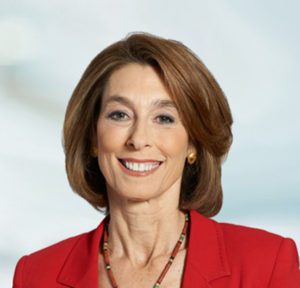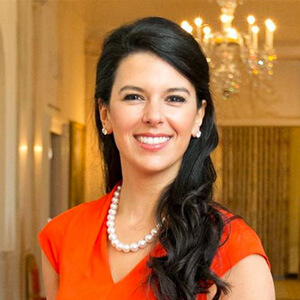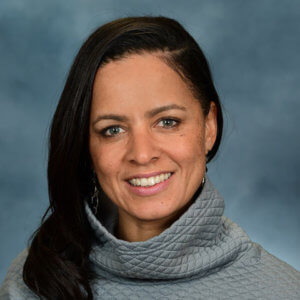
I was drawn to Women’s Foundation of Boston because of its hyper-focus on women and their educational and economic empowerment. I went to The Winsor School for seven years, an all-girls middle and high school just a few blocks away from WFBoston’s office. Going to an all-girls school meant I was constantly encouraged to speak up, given the necessary resources to pursue my interests, and raised in an environment that emphasized female leaders and causes. Entering co-ed college was daunting for me because I no longer had this built-in community, and I soon realized the rest of the world was not as concerned with female empowerment as my small school in Boston had been. I spent my freshman year trying to find that space again through club sports, Greek life, and women-focused studies, but I still found myself missing that community of strong women driven to use their strengths for the betterment of other women. When I learned about WFBoston and its mission, I was immediately interested because it perfectly exemplifies how the empowerment of one woman can become a platform for her to uplift hundreds of other women. More specifically, when I began to investigate WFBoston and the work it does, I found myself drawn to two specific factors. Firstly, the statistic that only 1.6% of all US charitable giving goes to women and girls—and of that 1.6%, 40% of it is directed overseas. That stat coupled with the ever-present reality of gender inequalities in the US really shocked me and made me realize that while the fight for gender equality is progressing each year, women and girls remain a vastly underserved demographic. Secondly, WFBoston stood out to be because of its unique approach to the nonprofit field. Through direct investment and targeted grants, WFBoston uses business and for-profit means to achieve incredibly impactful ends that serve female-oriented non-profits. The leaders of WFBoston chose to employ their own assets, skills, and business success to create a far-reaching platform and network that uplifts hundreds of women, building the empowerment of a few into the empowerment of many.
My internship experience was immensely rewarding and educational. I went into this summer with little understanding of both business operations and the non-profit sector. As the social media intern, I learned a lot about the general chain of command, process for grants, and infrastructure of a non-profit while also engaging with methods of marketing and social media. Prior to my internship, I had been involved with three other non-profits: the Nativity School of Worcester, LoveLane Special Needs Horseback Riding Program, and Boston Children’s Hospital Miracle Network. At the Nativity School as well as LoveLane, I experienced a more hands-on approach to volunteering and non-profit involvement. While these were both enriching experiences, I think my past work with Boston Children’s Network gave me more insight into how WFBoston operates. In high school, I helped plan an annual event for Boston Children’s Hospital Miracle Network charity through the solicitation of sponsorships and planning of fundraising events. I believe through that experience, I gained meaningful insight into the work that goes into marketing an event and cause as well as the role of development for non-profits, which in turn helped me plan and execute social media for WFBoston.
All in all, WFBoston is important to me because it seeks to create meaningful change in the lives of women and girls in the Greater Boston area through concrete and far-reaching initiatives. WFBoston identified a need and in only four years since its founding, has already addressed that need in so many ways, empowering hundreds of women and girls and paving the way for generations of women to reach their full potentials of economic, academic, and social autonomy. I’m really proud when I tell people I spent my summer working for such a meaningful cause, and I look forward to continuing my involvement with WFBoston as a volunteer.

 Laurie H. Glimcher, MD, was named President and CEO of the Dana-Farber Cancer Institute in 2016. She is also Director of the Dana-Farber/Harvard Cancer Center and the Richard and Susan Smith Professor of Medicine at Harvard Medical School. Previously, she was the Stephen and Suzanne Weiss Dean and Professor of Medicine of Weill Cornell Medicine and Provost for Medical Affairs of Cornell University. Dr. Glimcher is a distinguished immunologist, widely renowned for her work in one of the most promising areas of cancer research.
Laurie H. Glimcher, MD, was named President and CEO of the Dana-Farber Cancer Institute in 2016. She is also Director of the Dana-Farber/Harvard Cancer Center and the Richard and Susan Smith Professor of Medicine at Harvard Medical School. Previously, she was the Stephen and Suzanne Weiss Dean and Professor of Medicine of Weill Cornell Medicine and Provost for Medical Affairs of Cornell University. Dr. Glimcher is a distinguished immunologist, widely renowned for her work in one of the most promising areas of cancer research. Linda Henry is the CEO of the Boston Globe Media Partners. She is a co-founder of HUBweek, a civic collaboration between the Boston Globe, Harvard University, Massachusetts General Hospital, and MIT that explores the future being built at the intersection of art, science and technology. Linda is also an early-stage impact investor, an Emmy-Award winning television producer with two shows currently airing, and a community activist. She serves as a director of the Red Sox Foundation, is a trustee of the Liverpool Football Club Foundation, chair of the Boston Globe Foundation, and chairman of the John W. Henry Family Foundation. In addition, she is a founder of the Boston Public Market, serves on the advisory board of MassChallenge, and is on the board of the Engine at MIT. She earned a BS from Babson College and her MS from MIT.
Linda Henry is the CEO of the Boston Globe Media Partners. She is a co-founder of HUBweek, a civic collaboration between the Boston Globe, Harvard University, Massachusetts General Hospital, and MIT that explores the future being built at the intersection of art, science and technology. Linda is also an early-stage impact investor, an Emmy-Award winning television producer with two shows currently airing, and a community activist. She serves as a director of the Red Sox Foundation, is a trustee of the Liverpool Football Club Foundation, chair of the Boston Globe Foundation, and chairman of the John W. Henry Family Foundation. In addition, she is a founder of the Boston Public Market, serves on the advisory board of MassChallenge, and is on the board of the Engine at MIT. She earned a BS from Babson College and her MS from MIT. Bekah Salwasser joined the Red Sox Foundation as the Executive Director in January of 2018. She earned her B.A. in Psychology from Brown University and has extensive experience in philanthropy and both professional and semi-professional sports. After four years working as Community Relations Director for the Boston Celtics, Bekah went on to lead Scholar Athletes as its Executive Director, a program that supports public high school athletes with both their athletic and academic achievements. Earlier in her career, Bekah served as a professional soccer player for the Boston Breakers and as Executive Director of the Charlestown Lacrosse and Learning Center.
Bekah Salwasser joined the Red Sox Foundation as the Executive Director in January of 2018. She earned her B.A. in Psychology from Brown University and has extensive experience in philanthropy and both professional and semi-professional sports. After four years working as Community Relations Director for the Boston Celtics, Bekah went on to lead Scholar Athletes as its Executive Director, a program that supports public high school athletes with both their athletic and academic achievements. Earlier in her career, Bekah served as a professional soccer player for the Boston Breakers and as Executive Director of the Charlestown Lacrosse and Learning Center. Kimberly Fay Boucher is a business executive who has driven high performance organizations in technology, consumer products and social enterprise/nonprofit industries over the past 25 years. She is currently the Technology Commercialization Business Leader for the CTO at Analog Devices, where she is responsible for driving new technologies from incubation stages to successful businesses. Kim is also a Senior Lecturer at the MIT Sloan School of Management, where she teaches Disciplined Entrepreneurship in the Martin Trust Center. She holds a BS in Management Industrial Engineering from Worcester Polytechnic Institute and an MBA from Harvard Business School. She is a NCAA Academic All-American Women’s Basketball player and has been inducted into the WPI Hall of Fame.
Kimberly Fay Boucher is a business executive who has driven high performance organizations in technology, consumer products and social enterprise/nonprofit industries over the past 25 years. She is currently the Technology Commercialization Business Leader for the CTO at Analog Devices, where she is responsible for driving new technologies from incubation stages to successful businesses. Kim is also a Senior Lecturer at the MIT Sloan School of Management, where she teaches Disciplined Entrepreneurship in the Martin Trust Center. She holds a BS in Management Industrial Engineering from Worcester Polytechnic Institute and an MBA from Harvard Business School. She is a NCAA Academic All-American Women’s Basketball player and has been inducted into the WPI Hall of Fame. Ami Kuan Danoff (Co-Founder and CFO) is a private investor and the trustee of a foundation. She is a Harvard Quantum Founder and a member of the Harvard FAS Dean’s Council. Ami earned a bachelor’s degree from Harvard University in Visual and Environmental Studies and holds a dual master’s degree in Applied Economics and International Finance from the Sloan School of Management at MIT. She was a portfolio manager in global equities at Putnam Investments and co-manager of the Putnam International New Opportunities Fund, and also worked as an international equities analyst at Fidelity Investments.
Ami Kuan Danoff (Co-Founder and CFO) is a private investor and the trustee of a foundation. She is a Harvard Quantum Founder and a member of the Harvard FAS Dean’s Council. Ami earned a bachelor’s degree from Harvard University in Visual and Environmental Studies and holds a dual master’s degree in Applied Economics and International Finance from the Sloan School of Management at MIT. She was a portfolio manager in global equities at Putnam Investments and co-manager of the Putnam International New Opportunities Fund, and also worked as an international equities analyst at Fidelity Investments. Christina Heenan Suh holds an MBA from Harvard Business School, a bachelor’s degree from the University of Pennsylvania in English and Marketing and a master’s from Columbia University. A former management consultant, her work focused on strategy and implementation projects for Fortune 100 clients. She was also an account executive at Hill+Knowlton (WPP) marketing consumer packaged goods. As an Executive Board Member of the Brookline Education Foundation, which funds professional development in the Brookline Public Schools, Christina led their Grant and Oversight Committees. She currently sits on the board of the Brookline Library Foundation and teaches ESL at Rosie’s Place in Boston.
Christina Heenan Suh holds an MBA from Harvard Business School, a bachelor’s degree from the University of Pennsylvania in English and Marketing and a master’s from Columbia University. A former management consultant, her work focused on strategy and implementation projects for Fortune 100 clients. She was also an account executive at Hill+Knowlton (WPP) marketing consumer packaged goods. As an Executive Board Member of the Brookline Education Foundation, which funds professional development in the Brookline Public Schools, Christina led their Grant and Oversight Committees. She currently sits on the board of the Brookline Library Foundation and teaches ESL at Rosie’s Place in Boston. Christina Gordon (Co-Founder and CEO) holds a dual master’s degree in International Finance and Applied Economics from MIT’s Sloan School of Management. She earned her bachelor’s degree from Boston University and also studied for a joint master’s degree in Women’s Studies and Sociology at Brandeis with a focus on women in the workplace. Christina is a former assistant fund manager and technology industry equity analyst at Wellington Management. She also worked as a stock analyst at Fidelity Investments. She is a trustee of a private foundation, a member of Women Moving Millions and currently sits on the board of Rosie’s Place, a sanctuary for poor and homeless women in Boston.
Christina Gordon (Co-Founder and CEO) holds a dual master’s degree in International Finance and Applied Economics from MIT’s Sloan School of Management. She earned her bachelor’s degree from Boston University and also studied for a joint master’s degree in Women’s Studies and Sociology at Brandeis with a focus on women in the workplace. Christina is a former assistant fund manager and technology industry equity analyst at Wellington Management. She also worked as a stock analyst at Fidelity Investments. She is a trustee of a private foundation, a member of Women Moving Millions and currently sits on the board of Rosie’s Place, a sanctuary for poor and homeless women in Boston.